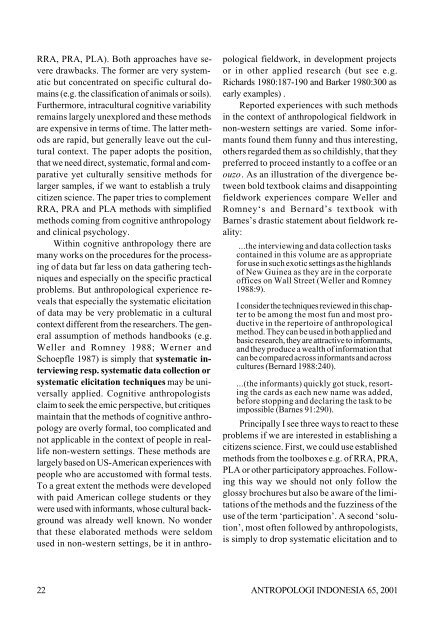Transethnic Identity and Urban Cognition in Makassar: - Antropologi ...
Transethnic Identity and Urban Cognition in Makassar: - Antropologi ...
Transethnic Identity and Urban Cognition in Makassar: - Antropologi ...
Create successful ePaper yourself
Turn your PDF publications into a flip-book with our unique Google optimized e-Paper software.
RRA, PRA, PLA). Both approaches have severe<br />
drawbacks. The former are very systematic<br />
but concentrated on specific cultural doma<strong>in</strong>s<br />
(e.g. the classification of animals or soils).<br />
Furthermore, <strong>in</strong>tracultural cognitive variability<br />
rema<strong>in</strong>s largely unexplored <strong>and</strong> these methods<br />
are expensive <strong>in</strong> terms of time. The latter methods<br />
are rapid, but generally leave out the cultural<br />
context. The paper adopts the position,<br />
that we need direct, systematic, formal <strong>and</strong> comparative<br />
yet culturally sensitive methods for<br />
larger samples, if we want to establish a truly<br />
citizen science. The paper tries to complement<br />
RRA, PRA <strong>and</strong> PLA methods with simplified<br />
methods com<strong>in</strong>g from cognitive anthropology<br />
<strong>and</strong> cl<strong>in</strong>ical psychology.<br />
With<strong>in</strong> cognitive anthropology there are<br />
many works on the procedures for the process<strong>in</strong>g<br />
of data but far less on data gather<strong>in</strong>g techniques<br />
<strong>and</strong> especially on the specific practical<br />
problems. But anthropological experience reveals<br />
that especially the systematic elicitation<br />
of data may be very problematic <strong>in</strong> a cultural<br />
context different from the researchers. The general<br />
assumption of methods h<strong>and</strong>books (e.g.<br />
Weller <strong>and</strong> Romney 1988; Werner <strong>and</strong><br />
Schoepfle 1987) is simply that systematic <strong>in</strong>terview<strong>in</strong>g<br />
resp. systematic data collection or<br />
systematic elicitation techniques may be universally<br />
applied. Cognitive anthropologists<br />
claim to seek the emic perspective, but critiques<br />
ma<strong>in</strong>ta<strong>in</strong> that the methods of cognitive anthropology<br />
are overly formal, too complicated <strong>and</strong><br />
not applicable <strong>in</strong> the context of people <strong>in</strong> reallife<br />
non-western sett<strong>in</strong>gs. These methods are<br />
largely based on US-American experiences with<br />
people who are accustomed with formal tests.<br />
To a great extent the methods were developed<br />
with paid American college students or they<br />
were used with <strong>in</strong>formants, whose cultural background<br />
was already well known. No wonder<br />
that these elaborated methods were seldom<br />
used <strong>in</strong> non-western sett<strong>in</strong>gs, be it <strong>in</strong> anthro-<br />
pological fieldwork, <strong>in</strong> development projects<br />
or <strong>in</strong> other applied research (but see e.g.<br />
Richards 1980:187-190 <strong>and</strong> Barker 1980:300 as<br />
early examples) .<br />
Reported experiences with such methods<br />
<strong>in</strong> the context of anthropological fieldwork <strong>in</strong><br />
non-western sett<strong>in</strong>gs are varied. Some <strong>in</strong>formants<br />
found them funny <strong>and</strong> thus <strong>in</strong>terest<strong>in</strong>g,<br />
others regarded them as so childishly, that they<br />
preferred to proceed <strong>in</strong>stantly to a coffee or an<br />
ouzo. As an illustration of the divergence between<br />
bold textbook claims <strong>and</strong> disappo<strong>in</strong>t<strong>in</strong>g<br />
fieldwork experiences compare Weller <strong>and</strong><br />
Romney‘s <strong>and</strong> Bernard’s textbook with<br />
Barnes’s drastic statement about fieldwork reality:<br />
...the <strong>in</strong>terview<strong>in</strong>g <strong>and</strong> data collection tasks<br />
conta<strong>in</strong>ed <strong>in</strong> this volume are as appropriate<br />
for use <strong>in</strong> such exotic sett<strong>in</strong>gs as the highl<strong>and</strong>s<br />
of New Gu<strong>in</strong>ea as they are <strong>in</strong> the corporate<br />
offices on Wall Street (Weller <strong>and</strong> Romney<br />
1988:9).<br />
I consider the techniques reviewed <strong>in</strong> this chapter<br />
to be among the most fun <strong>and</strong> most productive<br />
<strong>in</strong> the repertoire of anthropological<br />
method. They can be used <strong>in</strong> both applied <strong>and</strong><br />
basic research, they are attractive to <strong>in</strong>formants,<br />
<strong>and</strong> they produce a wealth of <strong>in</strong>formation that<br />
can be compared across <strong>in</strong>formants <strong>and</strong> across<br />
cultures (Bernard 1988:240).<br />
...(the <strong>in</strong>formants) quickly got stuck, resort<strong>in</strong>g<br />
the cards as each new name was added,<br />
before stopp<strong>in</strong>g <strong>and</strong> declar<strong>in</strong>g the task to be<br />
impossible (Barnes 91:290).<br />
Pr<strong>in</strong>cipally I see three ways to react to these<br />
problems if we are <strong>in</strong>terested <strong>in</strong> establish<strong>in</strong>g a<br />
citizens science. First, we could use established<br />
methods from the toolboxes e.g. of RRA, PRA,<br />
PLA or other participatory approaches. Follow<strong>in</strong>g<br />
this way we should not only follow the<br />
glossy brochures but also be aware of the limitations<br />
of the methods <strong>and</strong> the fuzz<strong>in</strong>ess of the<br />
use of the term ‘participation’. A second ‘solution’,<br />
most often followed by anthropologists,<br />
is simply to drop systematic elicitation <strong>and</strong> to<br />
22 ANTROPOLOGI INDONESIA 65, 2001


